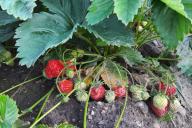Crop rotation makes your garden more productive and healthy, but why?
This method can increase your harvest and make your plants healthier, but it's important to understand, how.
Let's find out.
Pest and Disease Management
By rotating crops, you disrupt the life cycle of pests and pathogens, reducing their build-up in the soil and minimizing the risk of widespread infestations.
Nutrient Management
Rotating crops helps prevent the depletion of specific nutrients from the soil.

By rotating nitrogen-demanding crops with nitrogen-fixing crops, the soil's nutrient balance is maintained and the need for synthetic fertilizers is reduced.
Weed Control
By rotating crops, you can prevent the dominance of particular weed species and reduce the overall weed pressure in the field or garden.
Soil Health and Structure
Different crops have varying root structures and depths, which influence soil structure and nutrient distribution.
Rotating crops helps break up compacted soil and improves its overall health and fertility.
It also encourages beneficial soil organisms, enhances soil structure, and promotes better water infiltration and drainage.
Increased Yields and Sustainability
By managing pests, diseases, weeds, and soil nutrients effectively, the overall health and productivity of the land are enhanced.
Additionally, rotating crops promotes sustainable agriculture practices by reducing the reliance on synthetic inputs, minimizing environmental impacts, and improving long-term soil sustainability.









